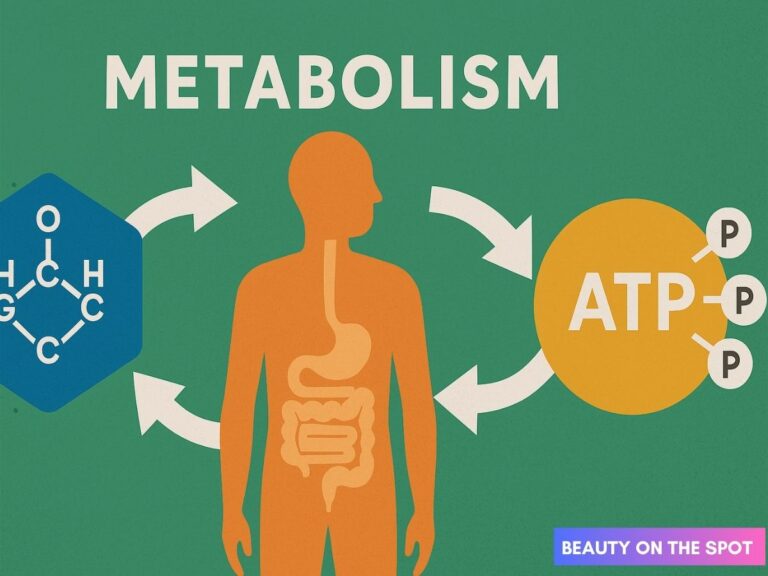How Sleep Affects Your Metabolism? Expert Research
Did you know that chronic sleep deprivation can really hurt your metabolic health? It can lead to weight gain and obesity. Studies show a strong link between sleep quality and how well your body metabolizes food.
I’ve looked into how sleep and metabolism are connected. It’s important to understand this to keep a healthy weight and feel good overall. Better sleep can help improve how your body works.
Key Takeaways

The Science Behind Sleep and Metabolism

It’s important to know how sleep and metabolism are connected. Our metabolism turns food into energy. Sleep patterns play a big role in this process.
What Is Metabolism and How Does It Work?
Metabolism is the set of chemical reactions in our bodies. It helps us function, grow, and stay healthy. It involves breaking down and building up molecules.

How fast we metabolize food affects our energy, weight, and health. A good metabolism is key to staying healthy.
The Biological Clock and Metabolic Processes
We have an internal clock that controls our body’s functions, including metabolism. This clock affects hormone levels like insulin and cortisol.
Bad sleep can mess with our internal clock. This can lead to metabolic problems. It might cause weight gain or metabolic disorders.
| Sleep Duration | Metabolic Rate | Hormonal Response |
|---|---|---|
| 7-9 hours | Optimal metabolic rate | Balanced insulin and cortisol levels |
| Less than 7 hours | Reduced metabolic rate | Increased cortisol levels |
| More than 9 hours | Variable metabolic rate | Potential insulin resistance |
Knowing how sleep and metabolism are linked is key to good health. Quality sleep helps our metabolism work better. This supports our overall well-being.
https://gigasecurehome.com/blink-camera-not-recording-without-subscription
How Sleep Affects Your Metabolism: The Fundamental Connection

It’s important to understand how sleep and metabolism are connected. Sleep affects our metabolic health in many ways.
During sleep, our body goes through important processes that help control how we metabolize food.
Sleep Cycles and Metabolic Regulation
Sleep cycles are key to how our body regulates metabolism. Each stage of sleep impacts how we handle glucose, energy, and hormones.
For example, deep sleep helps control glucose levels, while REM sleep affects hunger and fullness hormones.
When sleep cycles are disrupted, our metabolism can get out of balance.
Sleep deprivation can cause:
- Higher levels of cortisol, a hormone that makes us store fat
- Worse glucose control, which can lead to insulin resistance
- Changes in leptin and ghrelin, hormones that control hunger and fullness
Circadian Rhythms and Energy Expenditure
Circadian rhythms play a big role in how much energy we use. Our body’s natural rhythm controls hormone releases that affect metabolism. When our sleep matches our natural rhythm, our metabolism works best.
But, if our sleep is off, like with irregular schedules or sleep disorders, our energy use drops. This can cause weight gain and other metabolic problems.
https://gigasecurehome.com/blink-camera-flashing-red-6-times
The Consequences of Sleep Deprivation on Metabolic Health

Sleep deprivation affects our metabolic health in many ways. It changes how we process and store energy. Not getting enough sleep can lead to problems with glucose metabolism and insulin resistance.
Short-Term Effects on Metabolic Rate
Short-term sleep loss can lower our metabolic rate. This means we burn fewer calories when we’re not active. Studies show sleep-deprived people have a harder time losing or keeping weight off.
Long-Term Metabolic Disruptions
Long-term sleep loss causes bigger problems. It can mess up how we handle glucose, leading to insulin resistance. This is a big risk for type 2 diabetes and heart disease.
Insulin Resistance and Glucose Metabolism
Sleep loss hurts how we deal with glucose, causing insulin resistance. This makes it tough for glucose to get into cells. Blood sugar levels can go up, leading to metabolic syndrome and other health problems.
| Metabolic Change | Short-Term Effect | Long-Term Effect |
|---|---|---|
| Metabolic Rate | Decrease | Potential for weight gain |
| Glucose Metabolism | Minor fluctuations | Insulin resistance, risk of type 2 diabetes |
| Insulin Sensitivity | Minimal impact | Reduced insulin sensitivity |
Knowing how sleep loss affects our metabolism shows why sleep is key. Getting enough sleep helps keep our metabolism healthy. It also lowers the risk of metabolic disorders.
Hormonal Changes: How Poor Sleep Disrupts Metabolic Balance

Poor sleep can cause hormonal changes that upset metabolic balance. This is key for our health. When we don’t sleep well, our body’s hormones get out of balance, leading to metabolic problems.
Cortisol: The Stress Hormone Connection
Cortisol is a stress hormone that affects our metabolism. If we don’t sleep well, cortisol levels go up.
This can make us store more fat, mainly around our belly. This can harm our metabolic health and increase the risk of metabolic syndrome.
Leptin and Ghrelin: The Hunger Hormones
Leptin and ghrelin control our hunger and how we use energy. Leptin tells us to eat less, while ghrelin tells us to eat more.
Bad sleep messes with these hormones, making us hungrier and eat more. A study showed that not sleeping well lowers leptin and raises ghrelin, leading to weight gain.
| Hormone | Function | Effect of Poor Sleep |
|---|---|---|
| Cortisol | Stress response, metabolic regulation | Increased levels, fat storage |
| Leptin | Suppresses appetite | Decreased levels |
| Ghrelin | Stimulates appetite | Increased levels |
| Growth Hormone | Cellular repair, growth | Reduced secretion during deep sleep |
Growth Hormone and Cellular Repair
Growth hormone is released during deep sleep and helps repair and grow cells. Poor sleep lowers growth hormone levels.
This makes it hard for our body to fix and grow cells. This can affect our metabolic health, as good cell repair is key for metabolic function.
Sleep Duration and Its Impact on Your Metabolic Rate

Understanding how sleep affects your metabolic rate is key to better health. Sleep duration greatly influences your metabolic rate, impacting your overall health. Both short and long sleep times can harm your metabolic health.
Finding the right balance between sleep and metabolism is essential. Sleep duration affects metabolic rate by controlling glucose and hormone levels.
Optimal Sleep Duration for Metabolic Health
Research shows that 7-9 hours of sleep per night is best for your metabolism. Sleeping this amount helps manage glucose and energy use.
Sleeping too little or too much can disrupt these processes, causing insulin resistance and hunger changes.
Quality vs. Quantity: What Matters More?
While sleep time is important, sleep quality is just as vital for your metabolism. Bad sleep quality can mess with your metabolism, even if you sleep enough.
Sleep disruptions and poor sleep quality are big issues. So, it’s important to work on both sleep time and quality for better metabolic health.
The Sleep-Weight Connection: Why Poor Sleep Leads to Weight Gain

The link between sleep and weight is complex. It involves changes in how we feel hungry, how much energy we use, and how our body stores fat.
Knowing these factors helps us see why bad sleep can make us gain weight. It also shows how better sleep can help us lose weight.
Increased Appetite and Caloric Intake
Not getting enough sleep messes with our hunger signals. This is because of changes in two important hormones: leptin and ghrelin.
Leptin tells us when to stop eating, while ghrelin tells us when to eat more. Without enough sleep, we have less leptin and more ghrelin, making us hungrier and eat more.
Key statistics on sleep deprivation and appetite:
| Condition | Leptin Levels | Ghrelin Levels | Caloric Intake |
|---|---|---|---|
| Adequate Sleep | Normal | Normal | Average |
| Sleep Deprivation | Decreased | Increased | Increased |
Decreased Energy Expenditure
Sleep loss also makes us less active. When we’re tired, we don’t want to move as much. This means we burn fewer calories.
Plus, our resting metabolic rate (RMR) goes down, so our body burns fewer calories even when we’re not moving.
Fat Storage Mechanisms During Sleep Deprivation
When we don’t sleep well, our body changes in ways that make it store more fat. The lack of sleep messes with our hormones, making us store fat, mainly around our belly.
This is bad because belly fat is linked to serious health problems like diabetes and heart disease.
Getting better sleep can help fight these issues. It supports weight loss and keeps our metabolism healthy. By understanding how sleep affects our weight, we can improve our sleep and our health.
Sleep Quality and Its Effect on Exercise Performance and Recovery

Sleep is key for athletes and everyone else. It helps with exercise performance and recovery. Our body fixes itself, builds muscle, and boosts our immune system while we sleep. This is vital for those who work out a lot, as it helps them do their best.
How Sleep Enhances Workout Effectiveness
Sleep makes workouts better by boosting physical performance. Deep sleep fixes and strengthens muscles, bones, and tendons. It also makes us faster, more accurate, and quicker to react, leading to better workouts.
Studies show athletes who sleep well perform better and get hurt less.
Recovery, Muscle Growth, and Metabolic Benefits
Recovery is key after working out, and sleep is essential. Sleep releases hormones that help muscles grow and heal. This helps us recover faster and build more muscle over time.
Good sleep also helps with metabolism. It helps control blood sugar and insulin levels. So, by sleeping well, we can improve our fitness goals.
In short, sleep quality is very important for exercise and recovery. By valuing sleep, we can improve our workouts, recover faster, and stay healthy.
Sleep Disorders and Their Metabolic Consequences

Sleep disorders, such as sleep apnea and insomnia, are connected to metabolic problems. These issues not only harm sleep quality but also impact metabolic health greatly.
Sleep Apnea and Metabolic Syndrome
Sleep apnea causes pauses in breathing or shallow breathing during sleep. Studies link it closely to metabolic syndrome. This syndrome raises the risk of heart disease, stroke, and type 2 diabetes.
Metabolic syndrome includes high blood pressure, high blood sugar, and excess body fat. It also includes abnormal cholesterol or triglyceride levels. Sleep apnea can make these factors worse.
Insomnia and Its Effect on Energy Balance
Insomnia makes it hard to start or stay asleep. It disrupts energy balance, affecting hunger hormones and metabolic rate. People with insomnia often have more ghrelin and less leptin.
This can lead to weight gain and metabolic issues. It’s key to understand sleep disorders’ effects on metabolism for better treatment.
Practical Strategies to Improve Sleep for Better Metabolic Health

Sleep is key to good metabolic health. The right strategies can greatly improve your well-being. Focus on a good sleep environment, sleep hygiene, and nutrition and supplements. This will boost your sleep quality and metabolic health.
Creating an Optimal Sleep Environment
Your bedroom’s setup is vital for quality sleep. Make sure it’s dark, quiet, and comfy. Use blackout curtains, earplugs, or a white noise machine if needed. A good mattress and pillows also help a lot.
Sleep Hygiene Practices That Boost Metabolism
Good sleep hygiene is key for better sleep and metabolism. Stick to a regular sleep schedule, even on weekends.
Avoid caffeine, nicotine, and screens an hour before bed. Relax with reading or meditation before sleep.
Nutrition and Supplement Strategies for Better Sleep
What you eat and supplements can also help your sleep. Eat a balanced diet with fruits, veggies, and whole grains.
Foods like turkey can help you sleep. If you can’t sleep, try melatonin or valerian root. But talk to a doctor first.
| Sleep Strategy | Benefits | Implementation Tips |
|---|---|---|
| Optimal Sleep Environment | Improved sleep quality, enhanced metabolic health | Use blackout curtains, earplugs, or a white noise machine; invest in a comfortable mattress and pillows |
| Sleep Hygiene Practices | Better sleep consistency, boosted metabolism | Establish a consistent sleep schedule; avoid caffeine and electronic devices before bedtime |
| Nutrition and Supplements | Promotes relaxation, improves sleep quality | Consume a balanced diet; consider tryptophan-rich foods or supplements like melatonin |
The Relationship Between Sleep, Stress, and Metabolism
Sleep, stress, and metabolism are closely linked. Stress can harm our sleep, which then affects our metabolic health.
How Stress Affects Both Sleep and Metabolic Function
Stress makes our body release cortisol, a hormone for the “fight or flight” response. High cortisol levels can mess up our sleep and metabolism. It also leads to more fat around the belly.
Stress can also make us eat more high-calorie foods. This can worsen metabolic problems, leading to weight gain and poor metabolic health.
Stress Management Techniques for Better Sleep and Metabolism
Managing stress is key to better sleep and metabolism. Meditation, yoga, and deep breathing can lower cortisol and help us relax.
| Stress Management Technique | Impact on Sleep | Impact on Metabolism |
|---|---|---|
| Meditation | Improves sleep quality | Reduces cortisol levels |
| Yoga | Enhances relaxation | Boosts metabolic rate |
| Deep Breathing Exercises | Promotes relaxation | Reduces stress |
Adding these stress management methods to our daily life can help. We can sleep better, feel less stressed, and have a healthier metabolism.
Transforming Your Metabolic Health Through Better Sleep Habits
By adopting better sleep habits, you can significantly improve your metabolic health. Understanding the benefits of quality sleep on metabolism is key to lasting improvements.
Improving sleep habits involves creating a great sleep environment and practicing good sleep hygiene.
Nutrition and supplements also play a role. These simple changes can greatly impact your metabolic rate and overall health.
Sleep is vital for regulating metabolic processes. By prioritizing sleep and making a few simple changes, you can transform your metabolic health. You’ll wake up more energized and balanced.
FAQ Of How Sleep Affects Your Metabolism
How does sleep quality affect my metabolic rate?
Sleep quality greatly affects your metabolic rate. Poor sleep can slow down your metabolism. Good sleep helps keep your metabolism healthy. Sleep duration, disorders, and hygiene are key to your sleep quality and metabolism.
What happens to my metabolism when I don’t get enough sleep?
Not getting enough sleep hurts your metabolism. It can cause insulin resistance and increase cortisol. It also changes hunger hormones, leading to weight gain.
Can improving my sleep help with weight loss?
Yes, better sleep aids in weight loss. It boosts your metabolism, controls hunger hormones, and balances energy. These are key for managing weight.
How does cortisol affect my metabolism during sleep?
Cortisol, the stress hormone, affects your metabolism. High cortisol from poor sleep slows your metabolism and increases belly fat.
What is the optimal sleep duration for maintaining a healthy metabolism?
For a healthy metabolism, aim for 7 to 9 hours of sleep. This range supports your metabolism, controls hunger, and balances energy.
Can sleep disorders like sleep apnea affect my metabolic health?
Yes, sleep disorders like sleep apnea harm your metabolism. They increase the risk of metabolic syndrome and insulin resistance. It’s vital to diagnose and treat sleep disorders.
How can I improve my sleep to boost my metabolism?
To boost your metabolism, improve your sleep. Create a good sleep environment and follow hygiene practices. Use nutrition and supplements to enhance sleep. Maintain a consistent sleep schedule, avoid caffeine and electronics before bed, and relax before sleep.
Is there a connection between stress, sleep, and metabolism?
Yes, stress, sleep, and metabolism are connected. Stress can harm sleep and metabolism. Managing stress through meditation, yoga, or deep breathing can improve sleep and metabolism.





